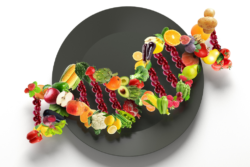As medicine is evolving, there are more technologies at our disposal to help investigate health and the underlying cause of symptoms, including infertility. Lifestyle genetic testing has recently hit the market, providing doctors and patients with a unique look into how genetics can identify gene-based influences on infertility. This helps to individualize preconception care and improve the chances of pregnancy.
What is genetic testing?
A genetic test looks at your DNA. Your DNA is a set of instructions that tells your cells what to make and how to function. We get half of our genetic code from our mom and a half from our dad (found in the egg and sperm) to make up 23 pairs of chromosomes.
In fertility, there are many types of genetic tests that look at the quality of the DNA to predict if there are any abnormalities that could affect pregnancy or the health of the baby, such as:
- PGT – embryo preimplantation genetic testing looks for common genetic problems that can cause implantation failure, miscarriage, and birth defects by testing the DNA of the embryos during IVF. This can help to improve the success rate of IVF by selecting genetically normal embryos. This test examines:
- Chromosomal number
- Specific genetic diseases
- Chromosome structure
- NIPT – non-invasive prenatal tests look for genetic abnormalities and the sex of the baby once a pregnancy is established, as early as 9-weeks.
What is Lifestyle genetic testing?
Lifestyle genetic testing looks at certain genetic variants that have been linked to various conditions that can influence fertility. Once these factors are identified, it can help to determine the lifestyle factors to reduce the impact of those genes. This test examines:
- Diet – risk for insulin resistance and gestational diabetes, gestational hypertension, the impact of caffeine on the risk for pregnancy loss, and the dietary recommendations to reduce incidence.
- Specific nutrients – what is the risk for insufficiency or deficiency of key nutrients essential for egg and sperm development and healthy pregnancy (including vitamin A, vitamin D, iron, choline, and omega-3)? What are the ideal doses for your individual requirements?
- DNA repair – are there any risks for poor utilization of folic acid, vitamin B12 deficiency, or an increase in homocysteine?
- Oxidative stress – how well does the body handle oxidants? Is there an increase in risk for oxidative stress and subsequent reduction in mitochondrial function or antioxidant status?
- Hormone metabolism – how are key hormones metabolized?
- Sensitivity to environmental toxins – how susceptible are you to the harmful effects of environmental toxins?
- Sperm quality – are there any risk factors that can impact sperm DNA fragmentation, motility, or concentration?
- Dysbiosis – is there a risk for chronic UTIs, vaginal candidiasis or dysbiosis that could affect the endometrial microbiome?
- Conditions – hemochromatosis, Celiac disease, Factor V Leiden (clotting disorder), endometriosis?
Since both partners can have fertility issues, each can benefit from genetic testing. A simple cheek swab is done to collect the sample and results are reviewed with one of the practitioners to determine the best approach.
To learn more about how you can support your fertility, or to book an online appointment with a Conceive Health ND, contact us today.



